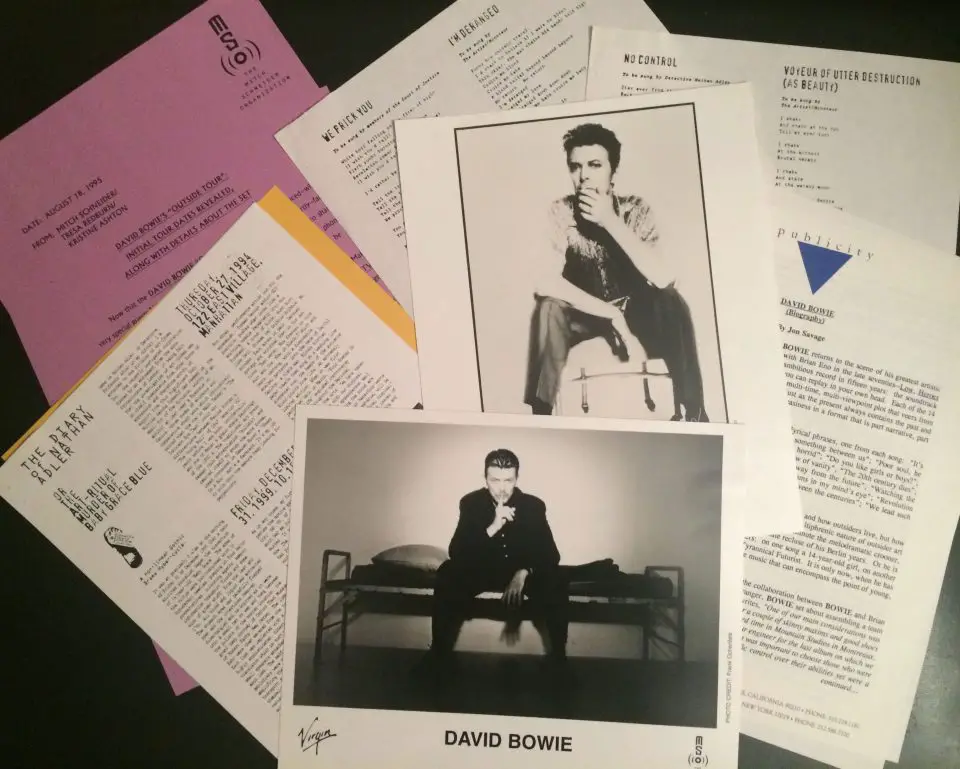The release
The January 1995 edition of Q magazine, published the previous month, contained a witty and wide-ranging email exchange between David Bowie and Brian Eno. Among the various subjects under discussion was the forthcoming album, which had not hitherto been reported.
I must tell you I’m overjoyed with the new mixes you sent. I really feel we are in an extremely exciting and uninvestigated area. Same goose bumps as 1977 and a Tuesday in late 1984.
Q, January 1995
The single ‘The Hearts Filthy Lesson’ was released on 11 September 1995. The song was accompanied by a range of edits and remixes across the various formats: Radio Edit; Bowie Mix; Alt. Mix by Trent Reznor & Dave Ogilvie with Chris Vrenna; Good Karma Mix or Simenon Mix by Tim Simenon; and Rubber Mix, Simple Text Mix, and Filthy Mix, all by Tony Maserati and Robert Holmes.
Out of the album’s context, the harshly industrial sound failed to impress listeners, and it peaked at number 35 in the United Kingdom. In the US it was Bowie’s first chart placing since 1987’s ‘Never Let Me Down’, though it climbed no higher than number 92.
1.Outside was released on 25 September 1995 to broadly positive reviews. It reached number eight in the UK albums chart, and 21 on the US Billboard 200.
Happy is not the word, I’m absolutely enraptured with it at the moment. I think it’s the best thing I’ve ever made. I can’t wait to do the followup. I think it’s a wonderful piece of work. It’s just the kind of music I need in my life…What I am tending to do is like what a painter does who has key signifying motifs that he develops during his career and then they start coming back and he incorporates them into his work. He ends up with a layer of his own images that he’s created over time. That’s possibly what I might be doing.
Seconds magazine, August/September 1995
The vinyl edition was titled Excerpts From 1.Outside. In addition to shorter edits of ‘Leon Takes Us Outside’ and ‘The Motel’, it omitted the songs ‘No Control’, ‘Wishful Beginnings’, ‘Thru’ These Architects Eyes’, and ‘Strangers When We Meet’, as well as the Algeria Touchshriek and second Nathan Adler segues.
Half the reason people listen so intently to Earthling is that it is exactly pretty much half the length of Outside. Outside was 76 minutes. And as soon as I released that I thought, ‘It’s much too fucking long. It’s gonna die.’ There’s too much on it. I really should have made it two CDs. I think you can overwhelm an audience. I think the attention span is quite short, although I used to like the fact that there was 20 minutes on each side of the album. What did happen was that any rubbish really stood out. (laughs) You had to be very careful about putting sort-of adequate pieces on or mediocre pieces. Because they really would show themselves when there was only 20 minutes a side. So it’s really quite a discipline to work at 40, 45 minutes. Because it all better be good, because it’ll really stand out if it isn’t. With 76 you could feasibly – of course, not in my case – but you could feasibly get away with inferior material (laughs)
Addicted To Noise, April 1997
In Japan the album included the bonus track ‘Get Real’, which had been recorded during the album sessions in Switzerland.
Two further singles from the album were released. ‘Strangers When We Meet’ came out on 20 November 1995, while the Pet Shop Boys’ remix of ‘Hallo Spaceboy’ followed on 19 February 1996.






This is really interesting, and very nicely written. I have a very minor quibble. That “Ikon” quote is slightly wrong. “It was important for this town, this locale, to have a populous…” says Bowie.
The correct noun is “populace” – “populous” is a homophonic adjective that isn’t appropriate here.
Thank you Tony! Corrected now.